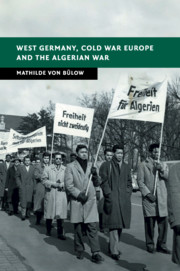Book contents
- Frontmatter
- Contents
- Acknowledgements
- List of abbreviations
- Introduction
- 1 Internationalising colonial warfare: FLN strategy and French responses
- PART I CREATING THE SANCTUARY: NOVEMBER 1954–MAY 1958
- 2 West German diplomacy and the Algerian war
- 3 The FLN's implantation in West Germany
- 4 Algeria and West German opinion
- 5 FLN contraband in West Germany
- PART II CONTESTING SANCTUARY AND SOVEREIGNTY: JUNE 1958–DECEMBER 1960
- PART III ASSERTING SOVEREIGNTY: JANUARY 1961–JULY 1962 AND BEYOND
- Conclusion
- Glossary of foreign terms
- Bibliography
- Index
5 - FLN contraband in West Germany
from PART I - CREATING THE SANCTUARY: NOVEMBER 1954–MAY 1958
Published online by Cambridge University Press: 05 September 2016
- Frontmatter
- Contents
- Acknowledgements
- List of abbreviations
- Introduction
- 1 Internationalising colonial warfare: FLN strategy and French responses
- PART I CREATING THE SANCTUARY: NOVEMBER 1954–MAY 1958
- 2 West German diplomacy and the Algerian war
- 3 The FLN's implantation in West Germany
- 4 Algeria and West German opinion
- 5 FLN contraband in West Germany
- PART II CONTESTING SANCTUARY AND SOVEREIGNTY: JUNE 1958–DECEMBER 1960
- PART III ASSERTING SOVEREIGNTY: JANUARY 1961–JULY 1962 AND BEYOND
- Conclusion
- Glossary of foreign terms
- Bibliography
- Index
Summary
In the early 1960s, Bernt Engelmann travelled to Tunisia to visit an ALN base on the Algerian frontier. After twelve uncomfortable hours spent in the back of a lorry, the Spiegel reporter discovered, upon arrival at the base, that the crates on which he had sat were filled with anti-personnel mines. Like him, these mines had begun their clandestine journey in Western Europe. Engelmann found an army equipped with Italian Beretta pistols, American and British infantry rifles and howitzers, as well as German Mauser carbines, mortars, bazookas and anti-aircraft guns. The soldiers’ sheath knives and cookware, too, were of German – Wehrmacht – vintage. Asked by Engelmann what he thought of the men who secretly sold these supplies to the ALN, Abdelhafid Boussouf – by then promoted to the powerful post of Minister for Armaments and General Relations in the GPRA – supposedly replied:
You know […] arms dealers are indispensible for a revolution. They serve the progress of humanity in their own way. What would have happened to the declaration of independence of the United States of America […] if General Washington had not known the addresses of a few capable gunrunners? […] [A]rms dealers are businessmen like any others. They take risks and want to make money, and they strive to balance their risks against their earnings. Some are honest merchants, others fraudsters – exactly as in other lines of business! And they are not half as swashbuckling and romantic as one generally imagines.
What Boussouf neglected to tell Engelmann was that many of the dealers sustaining the Algerian revolution with arms were in fact German. By 1960, the Bonn Republic had become a central hub in the FLN's efforts to procure war materiel. How could a country that at the time of the Algerian war's inception did not even possess its own army let alone a significant armaments industry come to play such a pivotal role in FLN supply networks? What impact did this development have on French counterinsurgency efforts, and how did the authorities react to the FLN's procurement activities in West Germany? The Federal Republic, this chapter argues, was always more than an extraterritorial refuge for FLN militants.
- Type
- Chapter
- Information
- West Germany, Cold War Europe and the Algerian War , pp. 129 - 152Publisher: Cambridge University PressPrint publication year: 2016



